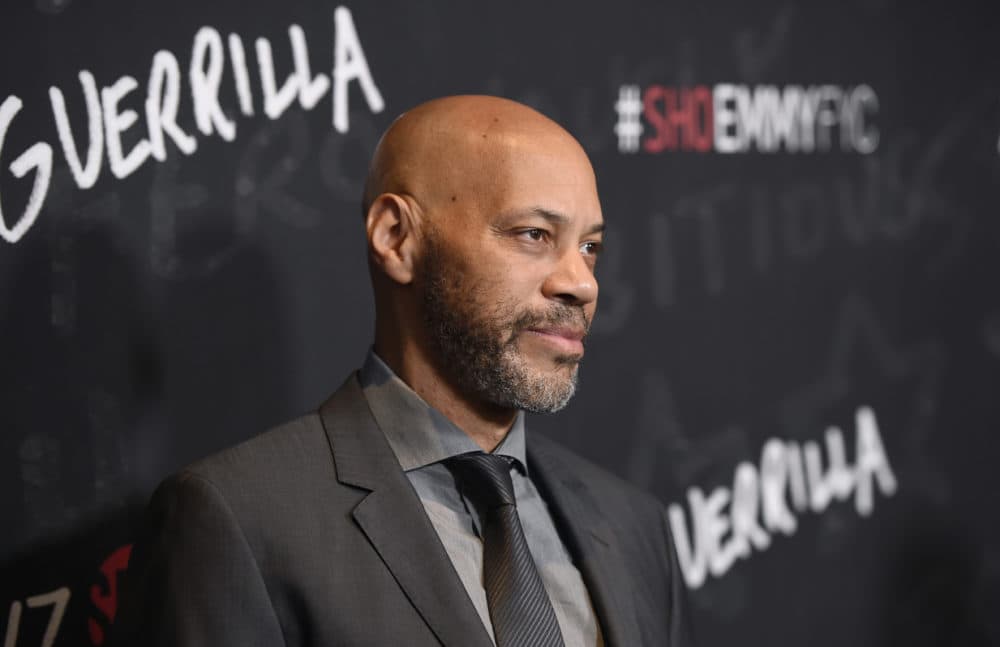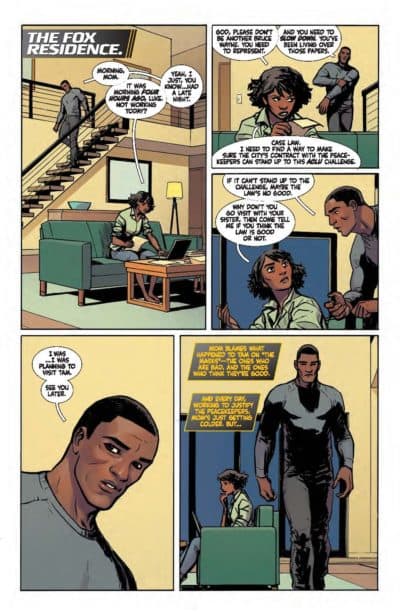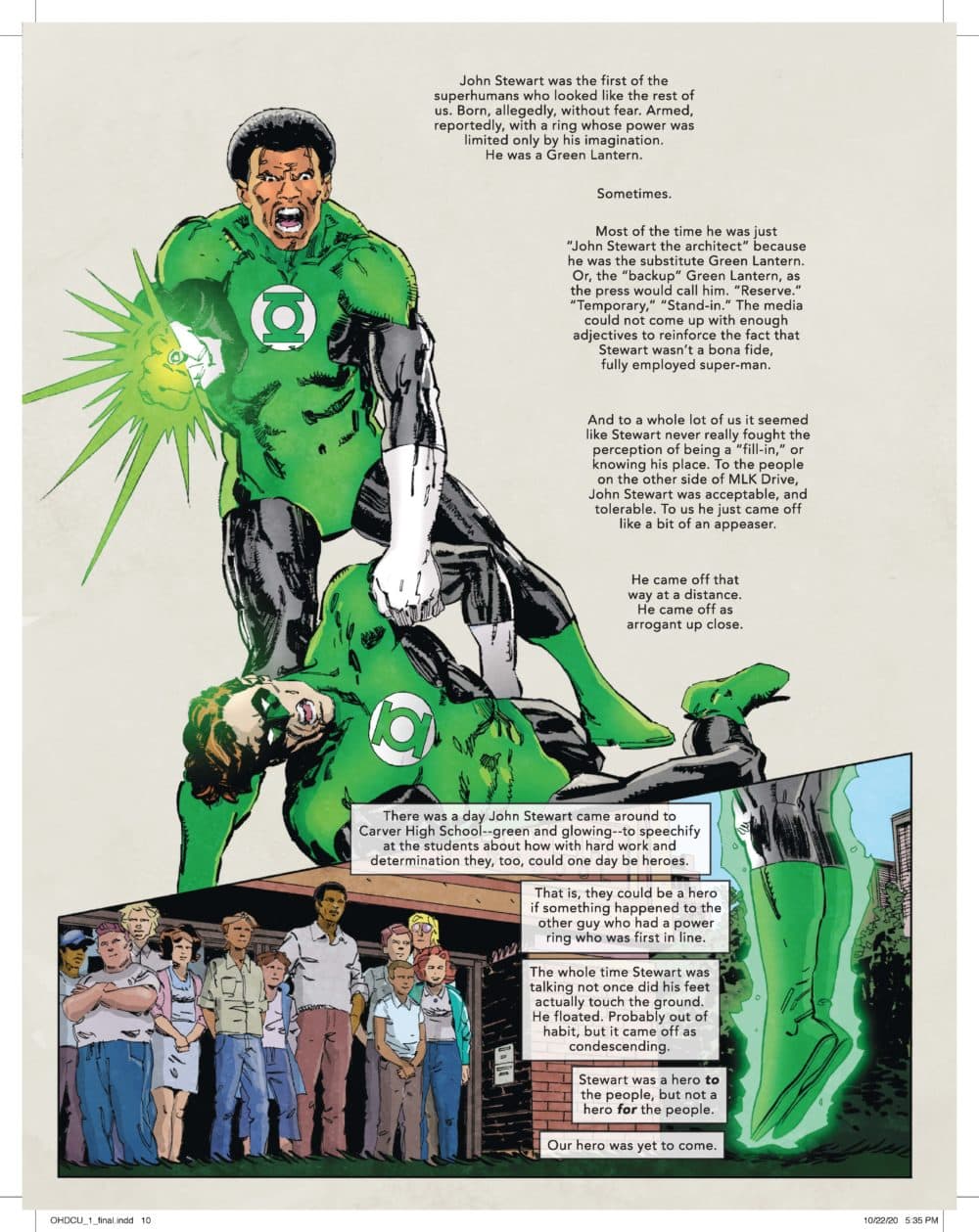Advertisement
Academy Award-Winning Writer John Ridley Puts His Spin On Beloved Comic Book Characters

John Ridley, an Academy Award-winning screenwriter, is known for serious films like "12 Years a Slave."
But he also loves comic books, both as a reader and writer. He created the “American Way" back in 2006 as well as its sequel, and now he's putting his own spin on the heroes of the DC Universe.
Ridley is working on a couple of comic book projects. The five-part series "The Other History of the DC Universe” looks at historical events and alternate storylines for DC heroes like Superman and Black Lightning. The second book in the series debuts in late January.
Released on Tuesday, the first issue of Ridley's "Future State: The Next Batman” features a Black Batman, Tim Fox, who takes over as the mega-rich Caped Crusader following the apparent death of Bruce Wayne.

Tim Fox’s character seems to be right on time, after widespread protests against police brutality and racism in the U.S. went global. Ridley says unfortunately, his work often collides with “imperfect” and “raw” moments.
“I would be equally as happy if some of this work came out and it just stood on its own,” he says.
Tim Fox is the son of Lucius Fox, the character Morgan Freeman played in “The Dark Knight” trilogy. Ridley says he was fascinated with what Tim Fox had been up to all these years after he left his family.
He also saw a chance to get into the real nitty-gritty of Tim Fox’s life and write about how a family of color navigates the world.
“There's an opportunity to really get into the specificity of this character,” he says. “And for me as a writer at this point in my life, specificity matters. Real motivations, even for an unreal character, they matter.”
Interview Highlights
On what specificity matters
“For me at this point, it's not just writing what I hope is a really terrific character with Tim, but it's the entire Fox family. I'm a dad now. I'm a husband now. I have kids who are around Tim's age. And to be able to say, ‘How does Tim's decision affect this entire family?’ That's what really excites me at this point, is that it's not just about Batman.
"It's about this family, and it's about a family of color, and it's about a family of color who are now about the richest people on the planet. So what are all these things and what are we saying and what are we saying about identity and responsibility and privilege that are unique to the bat world but aren't necessarily unique to the [real] world, but also aren't things that we necessarily unpack often? A Black family has a different responsibility. A Black family is going to be looked at differently. A Black family that has means, but do those means insulate them, elevate them, protect them in the same way Bruce Wayne was?”
Advertisement

On comparing his Tim Fox to Stan Lee’s Black Batman in “Just Imagine...”
“To me, and I don't say this against Stan or for my writing, but there are people, for example, and I think this may be a better way of saying it, who will say, 'Oh, hey, you're writing Black Batman,' and they're excited about it. They're like, 'Well, that's really, really cool.'
“And I say, 'Well, I'm not writing Black Batman, I'm writing a Batman and he happens to be Black. But more importantly, he is Tim Fox.' His version of Batman is going to be completely different if it was his brother or if his sister became a bat person. It has to be specific.”
On elevating superheroes such as Black Lightning in “The Other History of the DC Universe"

“I really don't think the prevailing culture understands how important it is for people to see themselves in entertainment, in the world. ... I still think about my dad taking me to see the Christopher Reeve 'Superman' film. I could not have loved that film more. I could not have been more inspired as a kid, and I loved that film. I love it to this day, and that's great. But I also think about when my wife and I took our kids to see 'Black Panther' and what that meant, not just seeing a hero and loving it and loving that sort of wish fulfillment, but seeing Chadwick [Boseman], seeing Wakanda, seeing Afrofuturism and then also seeing the millions of people around the world who felt the same way about 'Black Panther' that I felt about Christopher Reeve.
“Race didn't matter. It was the heroic nature of what these folks were doing. And as much as I love '12 Years,' as much as I love 'Red Tails' or 'American Crime,' you know, 'Black Panther' pushed the narrative and pushed representation and pushed acceptance in ways that these kind of serious, important films — I love what I do — but it's just different. These stories I'm telling right now with DC, with these heroes, this is the best time of my life. It really, really is as a storyteller. So I'm thankful for all the things that I've done, but there's a reason that these stories endure. There's a reason that when it comes to mass storytelling that everybody buys into, this is the thing that endures right now are these superhero stories. So very happy, very fortunate to be part of it.”
On how it feels to write comics
“You get to be a kid again. You get to be grown up and be a kid and play with toys. You get to go back to your youth. Coming out, there's a Superman that's ‘Red & Blue,’ which is a series, and I got to contribute a story. And the story that I contributed really deals with the first comic book that I ever read. To have the comic book company that you loved as a kid say, 'If you want to go back and represent closure, have at it’ … was really, really special to be able to do something where my kids are excited about it, to be able to do things where I can go to my kids literally and go, 'Hey, I'm telling the story. There are other heroes that I want to use and let me know who you'd really be interested in.' To be able to use heroes that look like their mom and say to them, 'Hey, who does this hero remind you of?' And they get excited about that. Yeah, this is the absolute best space, best time for me as a storyteller.”
Emiko Tamagawa produced and edited this interview for broadcast with Tinku Ray. Serena McMahon adapted it for the web.
This segment aired on January 5, 2021.
